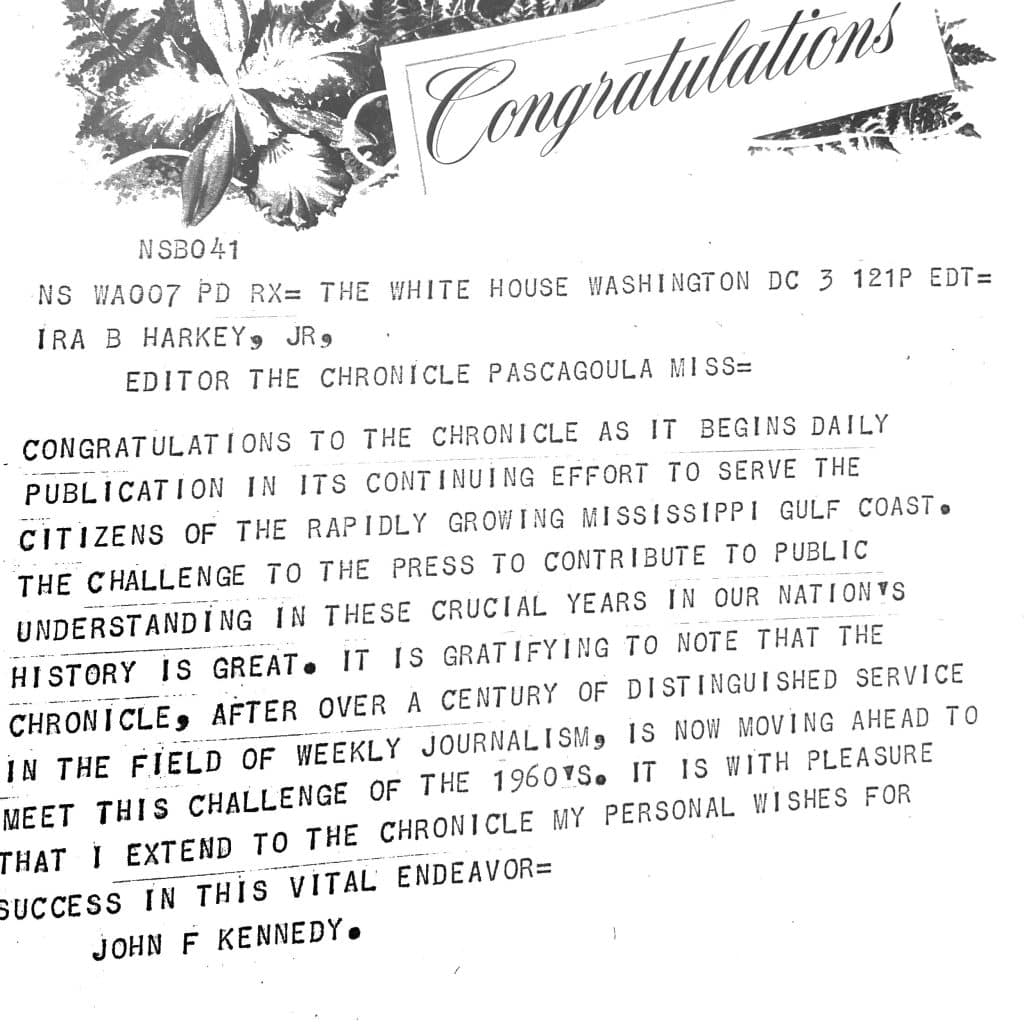Editor’s note: this article contains excerpts from an article published April 15, 2007, in The Mississippi Press. Author is Mimi Bosarge, the granddaughter of the late Ira B. Harkey, Jr.
“I had the feeling I could make a difference.”
Those words were spoken by the late Ira B. Harkey, Jr. about his fight against racial violence and the fight for equal rights during the 1950s and 1960s in Mississippi.
As the former editor and publisher of The Chronicle-Star, which would later become The Mississippi Press, Harkey wrote numerous editorials calling for a desegregated Mississippi.
But rather than receiving support for his editorials, he received death threats, gunshots through his office window, and burning crosses on the front lawn of his Pascagoula home and at his newspaper office. He was vilified for his editorials and even lost advertising sponsors because of his stand on civil rights. That didn’t stop him from speaking his mind.
In 1963, Harkey won journalism’s most coveted award – the Pulitzer Prize for a 1962 editorial calling for the integration of the University of Mississippi, where James Meredith became the first African-American student admitted to the university. This event, and others, would be detailed in Harkey’s 1967 autobiography, The Smell of Burning Crosses. Unfortunately, neither the Pulitzer Prize nor the autobiography did much to change peoples’ minds about civil rights at that time…
Ira Harkey purchased the Chronicle-Star in 1949 and immediately set out to make sure that all people written about in the paper were treated fairly, and so were those in everyday life. That wasn’t a very popular practice, but he persisted, as that was his philosophy – the love of and the demand for fairness.
His editorials on civil rights earned him a lot of trouble. But they also earned him the Pulitzer Prize, as well as a telegram from President John F. Kennedy congratulating him for meeting the challenge of contributing to public understanding during the crucial years of the civil rights movement.

Harkey sold the Chronicle-Star in 1963. Three years later it became The Mississippi Press.
In 2003, I became a correspondent for The Mississippi Press, writing a bi-monthly column (another writer and I alternated weeks) all about Pascagoula. I wrote little tidbits about things going on or who was doing what, things like, “So-and-so celebrated their 100th birthday” or “so-and-so” welcomed their first child. Each community covered by the Press had their own weekly column featuring news from just that city.
When I got the position I excitedly told my grandfather. He advised me to enjoy the experience, but above all, to be truthful and fair in my writing. That was how he wrote. And that’s what I’ve done, at least, I hope I have.
Eventually the Press did away with segregating the weekly columns by city, and I graduated to writing feature stories.
One of the first feature articles I wrote that stands out for me is recounting the time I took my daughter (then 18 months old) to the Wiggles concert in Mobile, AL, at the end of July 2006. For that article, I secured a meet and greet, and my daughter and I had our photo taken with the ultra-popular children’s singing group. An interview was to follow, but due to time constraints, I had to wait a couple days to do a phone interview with Anthony, the Blue Wiggle, before writing the article.
The next big article for me was the one on the first anniversary of Hurricane Katrina. I spoke to local people about their experiences from the storm. I also spoke with three celebrities who were affected as well – actor Jay Thomas, fitness guru Richard Simmons, and actor Gerald McRaney. Yes, I was giddy for a while after talking to “Major Dad.”
Over the years I wrote about many local residents of Jackson County – schoolteachers,
breast cancer survivors, military heroes, soccer team performances, and paranormal investigators, just to name a few.
But the article that is the most memorable to me was also the hardest and most challenging to write. It is the one about my grandfather, Ira B. Harkey, Jr.
He passed in October 2006, and several months later, he was awarded a posthumous resolution by the Mississippi State Senate. Senator Deborah J. Dawkins, who was so moved by his moral strength and his fight against racial prejudice and hate, drafted the resolution to honor him. It was passed in March 2007. A month later I wrote an article about it.
I have been a correspondent for 20 years. I wrote for The Mississippi Press from 2003-2015. After writing for another forum for about three years, I joined the Our Mississippi Home family in 2018. Throughout every article, I’ve done my best to maintain my “voice,” and to write as my grandfather advised – with truth and fairness. I feel like I am honoring him with every word I write.
While technically my grandfather didn’t actually write for The Mississippi Press, he did write for its precursor. The values and beliefs he held and lived are ones that I hope I’ve followed, both in my writing and in my life. I am immensely grateful and beholden to the Press for giving me the opportunity to follow in my grandfather’s footsteps, and I hope I do him proud in my continued writings for Our Mississippi Home.
So, farewell to you, The Mississippi Press. And, thank you.